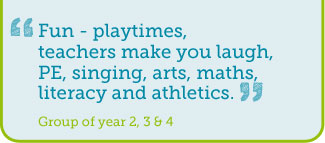At Westwood Academy, we track every child’s progress on an ongoing basis to ensure that we are constantly challenging them with appropriately pitched, individualised and stimulating learning that align with their individual needs. The insights gained from these assessments not only guide the daily efforts of our teaching staff but also inform the strategic decisions made by the school’s leadership. By prioritising the continuous improvement of learning provision for all children, we ensure an educational environment that is dynamic, effective, and responsive to the evolving needs of our students
Assessment Summary
We use Sonar to record progress and generate the performance information required to effectively manage in-cohort monitoring and analysis. On a half termly basis, the data for every child is updated for reading, writing and maths, linking the band/step awarded to statements taken directly from the national curriculum. For foundation subjects, the progress data is recorded termly and analysed twice yearly. Subject leadership skills have been targeted this year, with coaching from the most experienced practitioners provided to build observation, book scrutiny and pupil perception skills: this has given them a sharp focus on progress and assessment during the foundation subject monitoring that is rigorously followed throughout the academic year.
Children have individual literacy and numeracy targets. Our marking and feedback identifies the successes of each activity as well identifying next steps, with an emphasis on ensuring that the feedback process between children and adults has a positive impact on the progress of children (evidenced through regular book scrutiny and moderations).
Work scrutiny, data analysis, environmental walks, lesson observation and pupil perception are all used to triangulate the performance information, creating a wider view of assessment that links to the continued professional development of staff.
For children with SEN or in the disadvantaged group, provision maps are produced to help support the analysis of impact and effectiveness of the range of interventions and strategies used, informing whether they are continued, adapted or replaced by something else. In-cohort data is analysed half termly for reading, writing and maths to identify trends or patterns and adapt our provision where required, with whole school/cohort, disadvantaged and SEN focus.
Performance information is discussed on a half-termly basis as a minimum through pupil progress meetings held with the teacher/s from each class with either SLT or other Trust members. Focus here is put upon removing barriers to learning for children in the disadvantaged group, those below age related expectations (to close the gap to age related levels), SEN or children who are making below expected progress. The meetings are used to analyse the impact of interventions and strategies and to consider the barriers to progress, and how best to move each child’s learning forward during the next cycle of intervention.
Regular moderation of both literacy and numeracy is carried out in staff meetings to ensure accuracy and as a means of developing book scrutiny skills across the teaching staff. This is complemented by Trust wide moderations on a termly basis. There is also regular moderation for all year groups that takes place for both literacy and numeracy using trained moderators from across the Trust.
How we assess our children with SEND at SEAT








